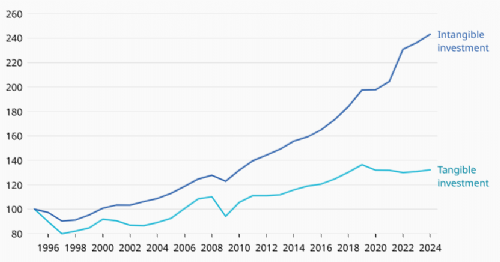Now in its twelfth year, Class 46 is dedicated to European trade mark law and practice. This weblog is written by a team of enthusiasts who want to spread the word and share their thoughts with others.
Click here subscribe for free.
Who we all are...
WIPO report shows growing investment in intangible assets
 Investment in data, software, brands and other IP-backed assets grew three times faster in 2024 than investment in physical assets, according to a new report by WIPO and Luiss Business School.
Investment in data, software, brands and other IP-backed assets grew three times faster in 2024 than investment in physical assets, according to a new report by WIPO and Luiss Business School.
According to the report, published today (9 July), the United States had the highest absolute level of intangible asset investment while Sweden was the most intangible-asset-intensive economy.
India saw the fastest growth in intangible investment from 2011 to 2022 of 6.6%, while intangible investment in Brazil surged by 14% in 2024.
This is the second edition of the World Intangible Investment Highlights. It found that in 2024 intangible asset investment across 27 high- and middle-income countries grew by about 3% in real terms.
Overall investment in intangibles grew from $7.4 trillion in 2023 to $7.6 trillion in 2024. It has grown at a compound annual growth rate of about 4% between 2008 and 2024, while tangible investment has grown by just 1% a year.
The report also showed that intangible investment constituted nearly 14% of GDP in 2024, compared to 11% for tangible investment.
Announcing the report, WIPO Director General Daren Tang said: “We're witnessing a fundamental shift in how economies grow and compete. While businesses have slowed down investing in factories and equipment during uncertain times, they're doubling down on intangible assets – IP, AI, data, software, know-how and others.”
He added that the trend has “profound implications” for policymakers.
The report spotlights the types of investments driven by the boom in artificial intelligence. “The sustained rise in intangible investment reflects its critical role in driving competitiveness and productivity in today’s economy. This shift is particularly evident in the age of AI, where economic growth depends on combined investments in software, data, skills and organizational capital,” said Cecilia Jona-Lasinio, Professor, Luiss Business School and co-author of the report.
Read more and watch a video on WIPO’s website here. The illustration shows figure 1 from the report.
Posted by: Blog Administrator @ 11.29Tags: WIPO, intangible assets. Luiss Business School, Daren Tang,


 Sharing on Social Media? Use the link below...
Sharing on Social Media? Use the link below...Perm-A-Link: https://www.marques.org/blogs/class46?XID=BHA5369

